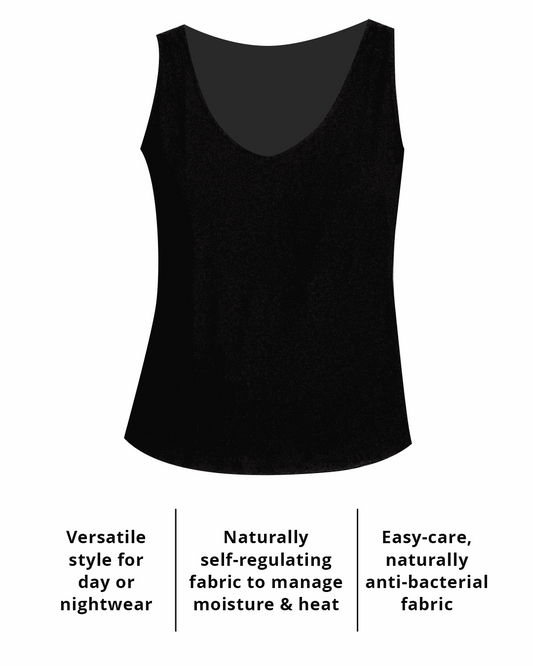
Why do I get night sweats - and what can I do about them?
Share
In addition to menopause, there are several other reasons that you might be sweating at night. If you are experiencing persistent night sweats, please see your healthcare practitioner and let them know what’s going on. It’s critical that you seek a professional opinion about your experience.
In any case, if you’re wondering about some of the other reasons you could be experiencing night sweats, here are a few:
Surgical menopause: When a person has a hysterectomy with the ovaries removed, they are no longer producing estrogen and they will go into immediate menopause. The most common symptoms are vaginal dryness, hot flashes and night sweats.
Infections: Certain infections, such as tuberculosis, endocarditis (inflammation of the heart lining), HIV/AIDS, and certain abscesses, can cause night sweats as the body tries to fight off the infection. Even the flu or CoVid can cause night sweats. If you are experiencing night sweats for longer than a few days, visit your healthcare practitioner.
Medications: Some medications, like antidepressants, hormone-blocking drugs, and certain medications used to lower fever, can lead to night sweats as a side effect.
Diabetes: Low blood sugar levels and overactive sweat glands, can trigger sweating, including during sleep.
Cancers: Certain cancers, such as lymphoma or leukemia, can cause night sweats as a symptom. This occurs due to the body's immune response to cancer cells.
Thyroid issues: Conditions like hyperthyroidism (overactive thyroid gland) can cause increased metabolism and subsequent night sweats.
GERD (Gastroesophageal Reflux Disease):** Severe acid reflux can sometimes cause night sweats due to discomfort and disrupted sleep patterns.
Obstructive sleep apnea: People with this condition may experience night sweats due to interrupted sleep and the body's efforts to regulate breathing during the night.
Anxiety and stress: Psychological factors, including anxiety disorders and stress, can trigger night sweats, disrupting sleep patterns. In fact, it’s an often overlooked cause of night sweats.
Alcohol: both alcohol use – especially in menopausal women and intolerance can cause sweating – and if you drink close to bedtime, it can result in night sweats. Alcohol withdrawal and intolerance will also induce sweating, including night sweats.
Idiopathic hyperhidrosis: In some cases, night sweats might occur without an identifiable cause, termed as idiopathic hyperhidrosis, where the body excessively sweats without a clear trigger or medical condition.
Room temperature: While a warm room temperature alone may not cause night sweats, if you have any of the above other issues, it will contribute to them. If you suffer from night sweats regardless of the reason, make sure you are sleeping in a cool room – generally recommended temperature range between 18-20C (64-68F) is ideal (obviously, this is easier in the cooler months – but do what you can in the warmer months to sleep more comfortably).
While there are other causes of night sweats than those mentioned here, these are the most common. If you experience persistent or severe night sweats, especially accompanied by other concerning symptoms, consulting a healthcare professional is crucial to determine the underlying cause and receive appropriate treatment.
Strategies to help you sleep better when you suffer from night sweats
What works for menopause will often work for other forms of night sweats too. Your body system has a narrower range of tolerance for heat and other inputs.
Make yourself as comfortable as possible with fabric and room temperature adjustments.
- Sleep in a cool room (16-18C/64-68F)
- Evaluate your sleepwear and ensure that you are wearing breathable, heat and moisture managing sleepwear
- Evaluate your bed linens for the same reasons. Your goal is to draw heat and moisture away from you so that you don’t wake up during a night sweat. Most bedding is not set-up to manage moisture and heat.
- Evaluate your mattress and mattress covers to ensure that they are not triggering your night sweats. Foam mattresses, in particular, allow heat to build up. A breathable non-waterproof mattress pad can help relieve some of that heat.
- Keep a journal to identify lifestyle issues that might be triggering your night sweats
- If you’re under a lot of stress and/or have anxiety, look into ways to address them including practicing breathing and yoga exercises, and seeking help from a counsellor or therapist. Relieving stress can have a significant impact on your night sweats.
* Note that officially, menopause is one day, one year after your last menstrual cycle. After your one day of menopause, you are considered post-menopausal.
You might also like:
What not to sleep in when you suffer from night sweats
Natural solutions to manage hot flashes and night sweats
Thermoregulating fabric and how it can help with night sweats
Disclaimer: The information provided in this blog post is for educational and informational purposes only. It does not constitute medical advice and should not be used as a substitute for professional medical expertise, diagnosis, or treatment. Always seek the advice of your physician or qualified healthcare provider regarding any questions you may have regarding a medical condition or treatment.




